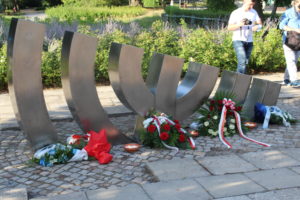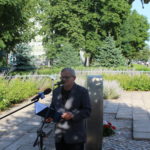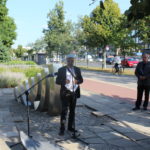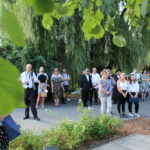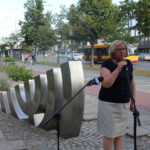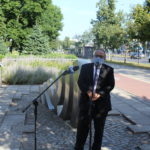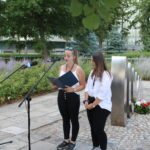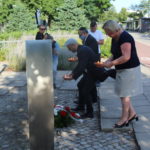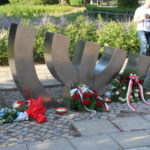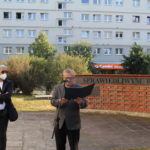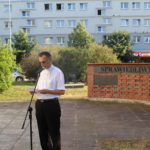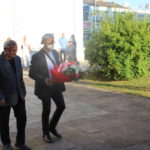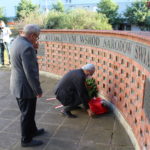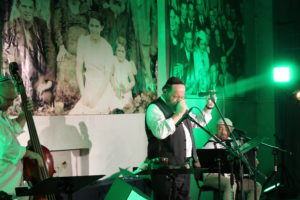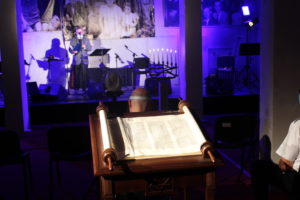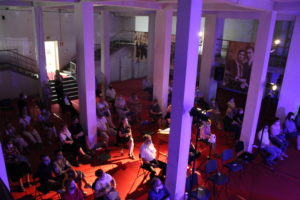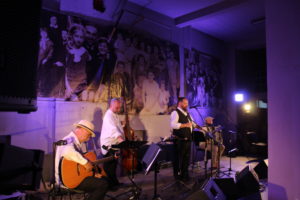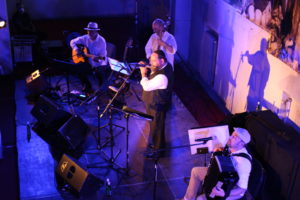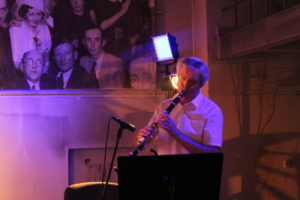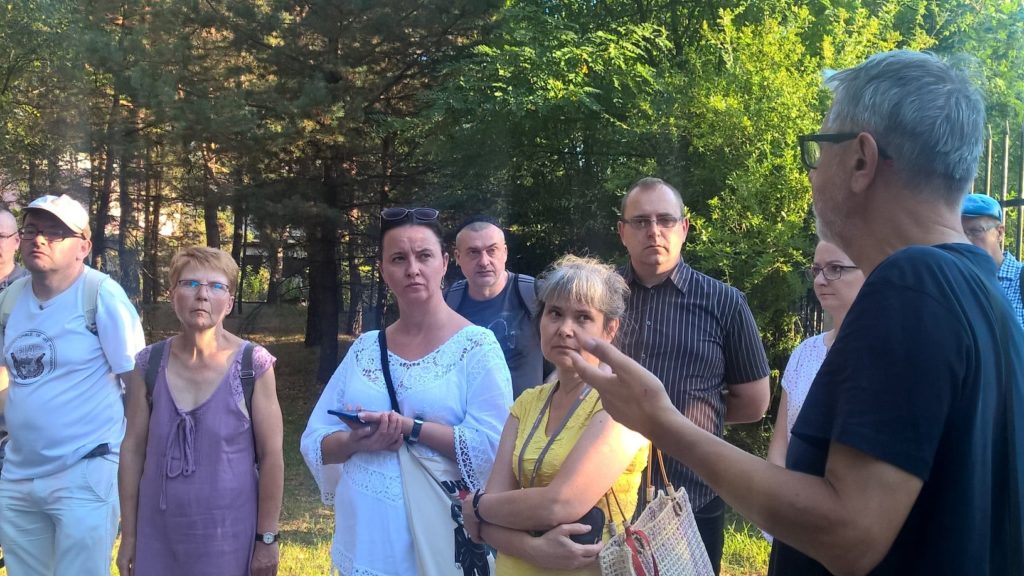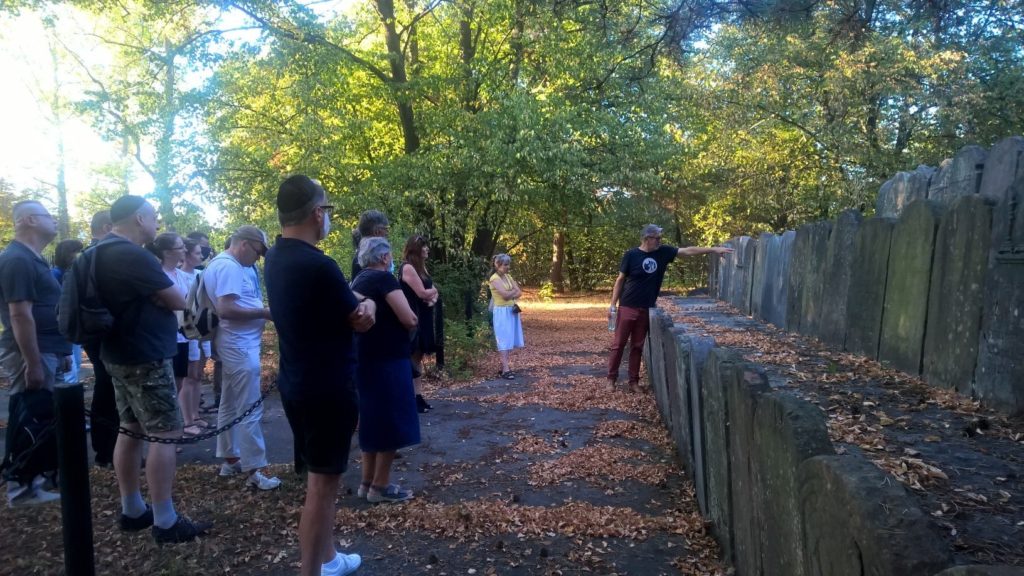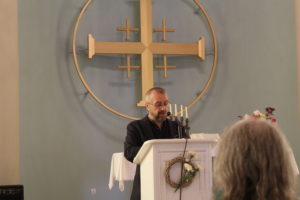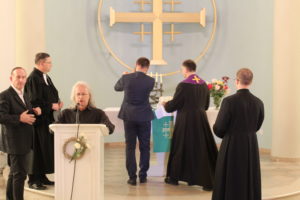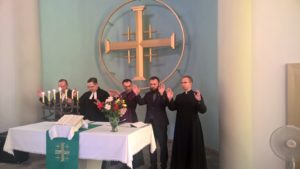The Jan Karski Society organized a series of events commemorating the extermination of Jews from the Kielce ghetto, which took place between August 20 24, 1942 when the Germans murdered 21,000 children, women and men in the Treblinka extermination camp and 1,500 Jews on the streets of Kielce.
On August 21, residents of Kielce gathered in front of the Menorah monument. In his speech Bogdan Białek, president of the Jan Karski Society, pointed out that those who participated in the ceremony at the Menorah monument did it primarily for themselves. He said that Jews died there and experienced terrible and unfair suffering in solitude. “Their death was meaningless, unfair and cruel. They were dying alone surrounded by the indifference of the world. It depends on us whether this death becomes fruitless or not. It seems to me that they die again and again on each anniversary. They have already died 78 times including their final death in Treblinka. Their death seems fruitless as the world today is no better than the world then, when one nation decided to annihilate another nation, when one group of people chose to annihilate another group of people just because they were who they were. To this day, there are a number of extreme voices that other people should be annihilated because they do not fit in with one’s ideas and expectations”, emphasised Bogdan Białek.
The deputy mayor of Kielce, Bożena Szczypiór, said: “Those events should have never taken place. It is worth emphasising and recollecting them as well as furnishing young generations with the knowledge about the tragic fate of Kielce Jews. This is why it is so important to meet here today”.
The Chief Rabbi of Poland, Michael Schudrich, referring to Bogdan Białek’s speech, pointed out that we live in a better world than 78 years ago, however, this world is still imperfect. According to Rabbi of Poland, we should be alarmed when some people claim that some social groups are not human. This is how it started over 80 years ago. He emphasized that one should not be silent when people are being divided into good and bad. Finally, he pointed out that one should not be indifferent to such behaviour. He emphasized that the participants of commemorative events such as the ones in Kielce are not indifferent people. Participants prayed at the Menorah Monument, reciting Psalm 23 for the murdered Jews from the Kielce ghetto. Young people read testimonies of survivors, in which the Nazi atrocities against the Jewish people were presented. City officials and organizers put flowers at the monument and lit candles. A prayer for Poles saving Jews during the war was said at the Memorial Wall of the Righteous Among the Nations. Earlier, President of the Society, Bogdan Białek, drew the attention to the fact that this place, established in 1995, is neglected on a daily basis. Addressing the representatives of Kielce authorities, he declared that the Jan Karski Society may take responsibility for the conservation of the place. He announced that he would like to create a “Square of Hope” to commemorate the Jews who contributed to the development of the city.
An unusual concert of Jewish songs took place in the former synagogue. It aroused great interest but due to sanitary requirements related to the corona virus pandemic, only about 40 people could participate in it. The songs were performed by the famous cantor, Symcha Keller, from Lublin. During the concert, we heard psalms and original Hasidic songs.
The next day, the second educational meeting took place at the Jewish cemetery in Kielce. The historian and editor, Dr. Marek Maciągowski talked about the history of the Kielce necropolis. The participants of the meeting learned about the symbolism of matzevahs gathered in the lapidarium.
Ecumenical God’s Word service, commemorating the Jews murdered in 1942, ended the several-day 78th anniversary of the extermination of the Kielce ghetto. The ecumenical service which took place on August 23, 2020 at the Ecumenical Temple pf Peace in Sienkiewicza Street in Kielce, was attended by clergy of the Świętokrzyskie Ecumenical Council and the Catholic Church. The service was presided over by the host of the temple, Pastor Wojciech Rutkowski from the Evangelical-Augsburg Church. It was attended by the clergy of the Catholic Church, the Polish-Catholic Church, the Church of Evangelical Faith, and the Church of Christians of Evangelical Faith.
The organizer, Bogdan Białek, president of the Jan Karski Society, recalled that although during the Holocaust Christian symbols were used by the Germans, after the war Christians worked for many years to repair the wrongs and the Catholic Church, in its declaration Nostra Aetate, called for brotherhood among peoples and opposed all forms of religious discrimination and persecution.
The President pointed out that during the celebration of the International Day of Remembrance for Victims of Violence Based on Religion or Faith, Pope Francis on Twitter called for an end to the use of religion to arouse hatred, violence, extremism and blind fanaticism. He also stressed the importance of remembering the past when shaping the future.
“Today, we pray for the victims of one third of Kielce’s population before the war not because it was a historic event which happened 78 years ago but because these people are present in us all the time. They are present in their ashes, because they died of hunger or were murdered in the streets of our city”, said Bogdan Białek.
In his commentary to the liturgical readings and testimonies of people who survived the liquidation of the ghetto, Pastor Wojciech Rutkowski appealed to us to start drawing far-reaching conclusions from such terrible events that took place in Kielce in order to change the surrounding world for the better.
“We have the power. Each person convinced by us not to do evil around themselves is our little victory. This is a step to ensure that in our land, in our world, no one will have to experience and see such tragedies again’, emphasized the pastor.
During the service, the names of the murdered Jews and testimonies of people who survived the liquidation of the ghetto and the deportation organized by the Nazis were read out.






